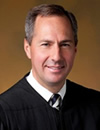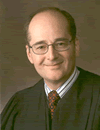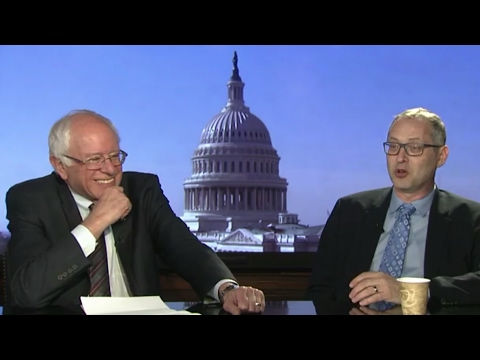Hon. Thomas Hardiman
United States Court of Appeals for the Third Circuit (2007-Present); United States District Court for the Western District of Pennsylvania (2003-2007)
We found four cases relevant to First Amendment speech freedoms where Judge Hardiman either wrote or joined an opinion. Additionally, he voted against a petition for en banc review of Delaware Strong Families v. Denn, where the Center for Competitive Politics (now the Institute for Free Speech) represented the plaintiff in one of the most important campaign finance cases of 2016.
Lodge No. 5 of the Fraternal Order of Police v. City of Phila., 763 F.3d 358 (3d Cir. 2014).
Of the four cases, this appears most important. The appeals court reversed a district court ruling that had held Philadelphia’s home rule charter, which banned city police officers from contributing to their union PAC, did not violate the First Amendment.
Judge Hardiman’s 57-page opinion carefully evaluates the history behind and the evidence for the prohibition, and strikes it down. He concluded that “given the lack of fit between the City’s stated objectives and the means selected to achieve it,” the charter ban was unconstitutional.
Hardiman recognized Philadelphia’s past corruption – whereby, in the 19th and early-to-mid 20th centuries, police protection was available only to supporters of the dominant Republican machine and was “used by machine politicians to control voting.” Id. at 363. However, banning police officers from making PAC contributions was not “an appropriately tailored means of addressing those concerns [because] sixty years later … the record is essentially devoid of th[ose] harms” Id. at 370, 372. The court also suggested that the law might be unconstitutionally under-inclusive in not banning all political involvement by the police. That is, individuals could provide other resources to “superiors’ preferred political causes,” and they could join associations that engaged in the political activity prohibited to them individually. Id. at 381-382 (“the police are hardly removed from politics”).
Delaware Strong Families v. Denn
The question presented in this lawsuit was simple. Should the state have the power to regulate groups that publish nonpartisan voter guides in essentially the same way that it regulates candidate committees, political parties, and PACs?
Judge Hardiman did not sit on the panel that heard this important case. However, he and the other Third Circuit judges received a petition asking the full en banc court to review the decision. A short brief accompanied the petition, which was denied. Judges Kent A. Jordan and Thomas I. Vanaskie voted to grant the petition, but Judge Hardiman did not.
The Center for Competitive Politics (now the Institute for Free Speech) represented the plaintiff in this case. Our attorneys won an injunction in district court, and our client was able to publish their voting guide in 2014. The state appealed the decision, and it was reversed.
After en banc review by the Third Circuit was denied, a certiorari petition was filed, unsuccessfully, with the U.S. Supreme Court. Justice Clarence Thomas wrote a highly unusual six-page dissent denouncing the Court’s refusal to hear the case. Such dissents are rare. Justice Samuel Alito also announced that he would have granted review.
We agree with Justice Thomas, who wrote in dissent of the denial of certiorari, “Even if the Court were to evaluate the Disclosures Act by applying its existing framework, the Delaware scheme sweeps far broader than those the Court has previously considered…. [I]f the Court is determined to stand by its ‘exacting scrutiny’ test, then this case is its proving ground. By refusing to review the constitutionality of the Delaware law, the Court sends a strong message that ‘exacting scrutiny’ means no scrutiny at all.”
In re Kendall, 712 F.3d 814 (3d Cir. 2013).
This is a highly unusual case, and there are very few, if any, cases like it. The Supreme Court of the Virgin Islands held the petitioner, a former superior court judge, in criminal contempt on the ground that an opinion he issued obstructed the administration of justice, and because his recusal was pretextual in that he sought to avoid complying with a writ of mandamus. The judge appealed to the Third Circuit.
Judge Smith wrote for the majority, with Judge Hardiman joining the opinion. Noting that the Supreme Court has not demarcated the metes and bounds of the First Amendment as applied to judicial speech, id. at 823-24, the court held that, in giving his legal analysis, a judge is engaging in expression, and that his opinion is entitled to First Amendment protection. Id. at 824. Because the First Amendment protects speech, “regardless of whether it is disruptive, offensive, vulgar or insulting,” id. at 825 (internal citation omitted), the court looked to the difference between regulating attorney speech via discipline versus criminal contempt. Id. at 825-26. The court held that the First Amendment prevented the government of the Virgin Islands from criminally punishing a sitting judge’s speech about one of his pending cases unless it posed a clear and present danger to the administration of justice. Id. at 826. The petitioning judge’s criticism of the decision to issue mandamus – even if it unfairly impugned the justices’ motives – did not pose such a threat. Id. at 830. Nor did the offending judge’s opinion delay or otherwise prejudice the criminal case. Id. As a result, the court vacated all of the lower judge’s criminal contempt convictions.
While the opinion vindicates First Amendment free speech rights, the case probably is not a good indicator of how any of the judges view First Amendment rights more broadly. The actions of the prosecutor in this case were unusual, if not beyond the pale, and it is unsurprising that judges would protect the free expression of one of their own, especially under these circumstances.
From the opinion of the Third Circuit:
The Supreme Court has yet to address the scope of a judge’s freedom of speech as a sitting judge….Yet other federal and state courts have repeatedly held that a “judge does not check his First Amendment rights at the courthouse door, to be reclaimed at the expiration of his judicial tenure….” We agree. What a judge says in an opinion is sufficiently expressive to trigger First Amendment review.
Having concluded that a judicial opinion qualifies as “speech,” we must determine the scope of its protection. Kendall argues that a judicial opinion is criminally punishable only under the government’s limited authority as sovereign to regulate speech that poses a clear and present danger to the administration of justice. By contrast, the Virgin Islands Supreme Court relied on the government’s broader authority to discipline attorneys for speech that is substantially likely to prejudice ongoing proceedings and held that this broader authority allows the government to criminally punish judicial speech that poses the same threat. We agree with Kendall….
That brings us to the question in this case: does the government’s broader authority to discipline attorney speech about ongoing proceedings also permit the government to hold a judge in criminal contempt for his speech about ongoing proceedings? We answer that question with a resounding “No.” Criminal contempt is no mere disciplinary tool. It derives, like all crimes, from a government’s power as sovereign….
In summary, the First Amendment prevents the government from criminally punishing a sitting judge’s speech about one of his pending cases unless it poses a clear and present danger to the administration of justice.
B.H. v. Easton Area Sch. Dist., 725 F.3d 293 (3d Cir. 2013) (Hardiman, J., dissenting).
The majority and dissenting opinions in this case span 107 pages, and the length of the opinion appears inversely proportional to its importance. The jurisprudence on free speech at schools attended by minors is a tangled mess. This case was no exception. While Judge Hardiman supported restrictions on student speech in this case, it’s worth keeping in mind that the ruling applied only to the speech rights of children attending a public middle school. In short, it is unlikely that this case says much about Judge Hardiman’s views on First Amendment speech rights for adults.
This case decided whether a middle school could constitutionally prohibit the wearing of “I ♥ boobies! (KEEP A BREAST)” breast cancer awareness bracelets by students.
The majority ruled that it could not, since the speech could plausibly be considered commentary on a social issue and was not plainly lewd.
Judge Hardiman dissented, arguing that the majority’s reliance on Justice Alito’s concurring opinion in Morse v. Frederick, 551 U.S. 393 (2007), the Supreme Court’s most recent student speech case, was improper since four other justices had joined Chief Justice Roberts’ majority opinion. 725 F.3d at 327. Hardiman wrote that it was a “close case,” but that “[the] bracelets would seem to fall into a gray area between speech that is plainly lewd and merely indecorous. Because I think it objectively reasonable to interpret the bracelets, in the middle school context, as inappropriate sexual innuendo and double entendre, [I dissent].” Id. at 335.
State Troopers Fraternal Ass’n of N.J. v. New Jersey, 585 F. App’x 828 (3d Cir. 2014).
This case reviewed an investigation of a police union president for unauthorized release of information, which he claimed violated his First Amendment rights.
The court said the appellant’s “status as union president does not exempt him from compliance with State Police rules and regulations.” Id. at 832. Even assuming he was engaged in protected First Amendment activity, he had demonstrated no chilling effect on his expressive rights, nor a credible fear of retaliation.
Conclusion
Judge Hardiman’s opinion in Lodge No. 5 shows close attention to the need for government to carefully tailor laws that might restrict speech. Although it is difficult to know why a judge votes against an en banc hearing, Delaware Strong Families raised exactly that problem, and Hardiman nonetheless passed on an opportunity to address the issue and correct the panel’s ruling.














